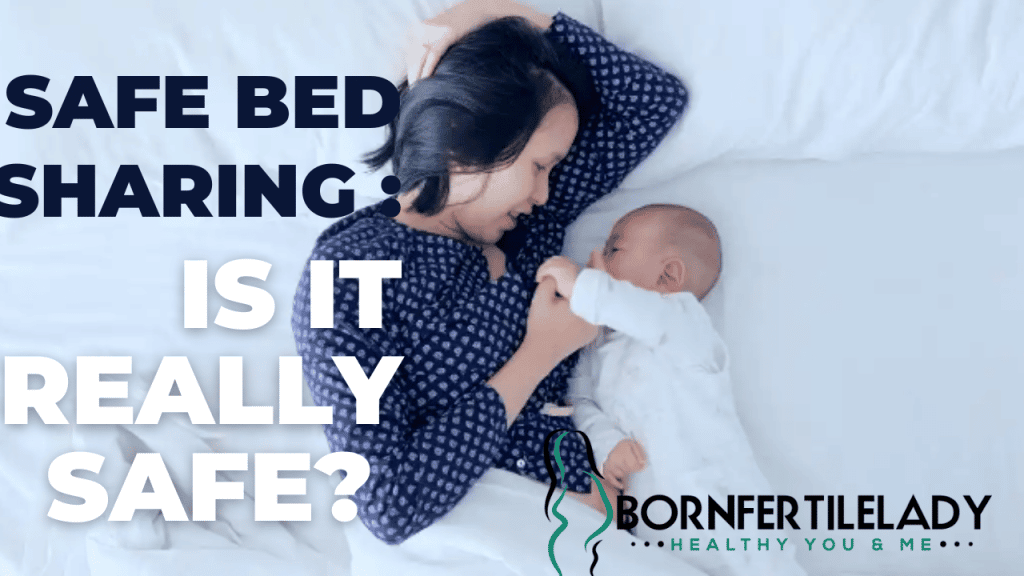Safe bed-sharing is the dream of every mother in other to be able to express that unexplainable love that exists between her and her newborn.
Sharing a bed with your baby could be one of the lovely things you wish to be doing as a new mom to constantly keep your baby under check and admire your baby’s cuteness.
But is it safe to share the same bed with your newborn?
Let’s learn more about what safe bed sharing is, what you can do to share your bed safely, the potential risk, and how to encourage your baby to sleep alone.

Why do some mothers bed share with their babies and what is Safe bed sharing?
Bed sharing is a type of co-sleeping in which parents and babies sleep together on a couch, bed, or chair.
There are so many reasons for bed sharing, sometimes this is done to promote breastfeeding at night but other reasons for bed sharing includes :
- Bed sharing helps to support breastfeeding by making it more convenient to breastfeed at night.
- It improves the number of months a mother breastfeeds her child.
- It also makes it easier for babies to go to sleep.
Read also: How do I prepare for pregnancy?
Safe bed sharing, is it safe ?
Sharing a bed is a common practice among parents, especially new mothers. It can be a lot of fun because you will have more time to enjoy your baby, breastfeed, and bond with him or her.
Despite this, health professionals have advised against bed-sharing because it lowers the chance of infant and baby death.
The following are some reasons that make bedsharing risky, especially when done on an adult’s bed:
- You should avoid sharing an adult bed with your infant because there is a risk of suffocation brought on by soft bedding like pillows, blankets, comforters, memory foam, waterbeds, or soft mattresses.
- A bed frame that traps the baby’s head or has dangling cords could strangle your child.
- Another risk factor is a bed frame that allows part of the body to pass through it. As far as you can, try to avoid sharing a bed because of this.
- When a baby is entrapped or wedged between a mattress and a headboard, wall, or another object, it might suffocate or get entrapped so do not bed share with your baby.
Read also: 10 Best Nursing Chairs for Breastfeeding Mothers in Nigeria 2022
Safe bed sharing tips: What You Can Do to Bed Share Safely
Some parents feel that bedsharing with their infants is best for their health and safety, but here are some precautions you should take when sharing with your baby:
- To lessen the chance of SIDS, always put your infant to sleep on their back.
- To prevent overheating, dress your kid to the bare minimum.
- When it’s time for bed, let your baby choose a pacifier; don’t force him or her. You don’t need to buy a new one if the pacifier falls out while you’re sleeping.
- Stop swaddling if your infant tries to roll over while you are swaddling him or her.
- Avoid letting your infant sleep by himself in a bed with adults.
- You shouldn’t put your baby to sleep on a soft surface like a sofa, waterbed, or soft mattress. A firm mattress is a must for your bed.
- Check to see whether your bed’s headboard and footboard have any openings or cuts that could entrap your baby’s head.
- So that your infant won’t get stuck between the bed frame and the mattress, make sure your mattress fits tightly in the frame.
- In the course of sleep, avoid covering your baby’s head.
- On the bed, avoid placing pillows, comforters, quilts, or other plush or soft materials. In place of blankets, you may dress your child in a sleeper.
- A youngster could get entangled in ropes from drapes or blinds and strangled if you set your bed next to them.
- A baby on your chest should not cause you to nod off.
- If you have a kid, avoid sleeping on a couch, rocker, or similar furniture.
- Never wrap your child in a swaddle, sleeper, or another type of weighted blanket.
- The use of sleep positioners or monitors that may track a baby’s breathing and heart rate is not advised if the goal is to reduce the risk of SIDS.
- Do not let your baby sleep on a sitting gadget or another item that isn’t made with sleeping babies in mind.
- Avoid using substances that could impair your alertness, such as tobacco co, alcohol, or medications.
Take home
Babies or infants who are less than 4 months, preterm babies, and those who had a low birth weight are at a greater risk of sudden infant death syndrome as a result of unsafe bed-sharing.
So we will advise that you avoid bed sharing for the sake of your baby’s life and wellbeing.
